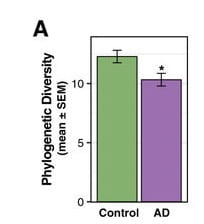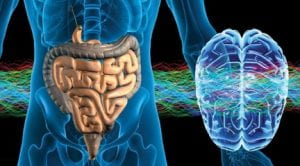The community of micro-organisms in our gut could help prevent Alzheimer’s Disease, according to new research conducted by scientists at the University of Wisconsin, Madison. Alzheimer’s patients have a unique – and less diverse – community of gut micro-organisms than their healthy counterparts, according to research conducted by Drs. Barbara Bendlin and Federico Rey and their team. The scientists outlined this finding a 2017 Scientific Reports article: “Gut microbiome alterations in Alzheimer’s disease”.

Dr. Federico Rey, Dr. Barbara Bendlin and Nicholas Vogt (an MD/PhD student) are pictured left to right. These scientists discovered that Alzheimer’s patients have a unique community of gut microbes. Photo courtesy of Clint Thayer, UW-Madison.
Our brain and gut have an intimate relationship. Our gut can produce chemicals that influence our state of mind, and our brain can suppress digestion when we are stressed. This relationship is often referred to as the “ gut-brain axis”. The gut-brain axis is controlled by micro-organisms or microbes. Microbes often get a bad rap. However, many of them work to help our brain function every day. According to a 2016 study, there is one bacterial cell than for every human cell in our gut.
Many of us will develop dementia as we age, and Alzheimer’s disease as the most common type. Scientists still aren’t sure how Alzheimer’s develops, or how to treat it. When patients develop Alzheimer’s, aggregates of proteins called ‘amyloids’ build up in their brain cells. Scientists have found that the changing community of gut microbes could contribute to these amyloid aggregations, at least in mice.
In their study, Drs. Bendlin and Rey compared the gut microbe community in Alzheimer’s patients to those without Alzheimer’s. The scientists collected fecal samples from participants and compared the richness, diversity, and composition of the microbes present. Alzheimer’s patients had less rich and diverse microbe communities in their gut. They also had a unique composition of microbe families present in their fecal samples, which could be contributing to their disease.

This graph shows that people with Alzheimer’s Disease (AD) have a less diverse community of microbes in their fecal samples. Graph courtesy of Drs. Barbara Bendlin and Federico Rey.
Drs. Bendlin and Rey think that this unique microbe community in Alzheimer’s patients could contribute to the progression of their disease, via the gut-brain axis. If this is the case, they suggest that scientists investigate if changing the gut microbe community could prevent the development of Alzheimer’s in at-risk populations. “The handful of studies that have been published on Alzheimer’s disease and gut microbiome are interesting and promising,” Dr. Bendlin says, “but a lot more research is needed.”
In Dr. Bendlin’s own words: “More research on gut microbiome will point towards new ways to keep people healthier in older age, and possibly even prevent, delay, or treat age-related diseases. In the future, we may be able to encourage certain microbes to take up residence in the gut, or develop therapies that mimic the actions of microbes.”
If our gut can influence our brain health, why not recruit a small army of micro-organisms to help us reach a healthy state of mind?
By: Anna Marie Yanny
*This blog post was written as an assignment for Phys 497 – Science Communication (Spring 2018)

